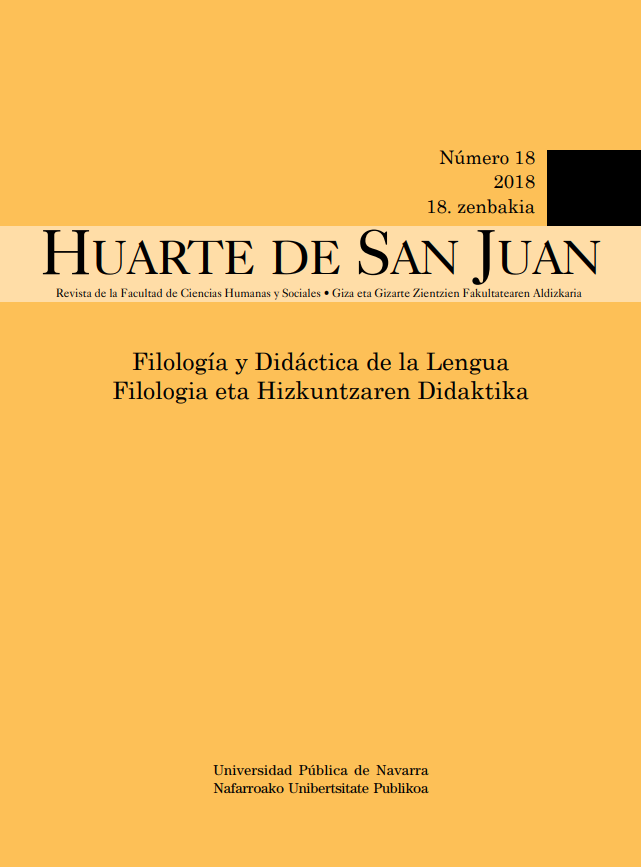Desarrollo de la competencia metalingüística en Secundaria mediante la producción de microtextos: el concepto de cambio semántico
Keywords:
Metalinguistic awareness, micro-writing, writing tasks, peer learning, learning to thinkAbstract
We consider documenting and analyzing actual examples of the classroom work, the positive answer of the students to tasks of writing that promote the development of the metalinguistic awareness, critical thinking and learning to learn competences, by means of the individual writing production put jointly in great group later. This practice demonstrates possible and necessary new learning methodologies and the change of the educational urgent paradigm in Secondary Education. We will use examples of actual texts of the students in Spanish Language and Literature, prepared for the acquisition of the concept of semantic change. In the line of research of active methodologies, competences learning and some aspects of creative writing, following the current «unstructured game», we propose this «not so structured writing» which reject the dependence of the literal reading. The most relevant results demonstrate essential and not so classical proposals of task and perspectives for the development of the metalinguistic awareness. The employment of nearby examples that draw the attention on the mechanisms of languages also turns out to be effective to stimulate thinking, reverse knowledge and uses, improve metalinguistic awareness and develop more receptive attitudes.
Downloads
References
Allué Villanueva, C. (2013). Buenas intenciones y práctica real: la expresión escrita en la asimilación de conceptos lingüísticos en bachillerato. Huarte de San Juan. Filología y Didáctica de la Lengua / Filologia eta Hizkuntzaren Didaktika, 13, 123-128. Recuperado de https://academica-e.unavarra.es/xmlui/handle/2454/9412.
Allué Villanueva, C. (2014). Microtextos y desarrollo de las competencias literaria y lingüísticas. Cuadernos de Literatura Infantil y Juvenil CLIJ, 260 (jul-agosto), 40-47. Recuperado de https://academica-e.unavarra.es/xmlui/handle/2454/9412.
Campoy Garrido, N. (2010). Relaciones semánticas entre las palabras: hiponimia, sinonimia, polisemia, homonimia y antonimia. Los cambios de sentido. Contribuciones a las Ciencias Sociales, mayo. Recuperado de http://www.eumed.net/rev/cccss/08/ncg.htm.
Carratalá Teruel, F. (s. f.). Los cambios de significado de las palabras. Recuperado de https://docplayer.es/20673953-Los-cambios-de-significado-de-las-palabras-fernando-carratala-teruel.html.
Cassany, D. (1990). Enfoques didácticos para la enseñanza de la expresión escrita. Comunicación, lenguaje y educación, 6, 63-80. Recuperado de https://dialnet.unirioja.es/servlet/articulo?codigo=126193.
Cassany, D. (2016). La escritura extensiva. La enseñanza de la expresión escrita en secundaria. Enunciación, 21(1), 91-106. Recuperado de http://dx.doi.org/10.14483/udistrital.jour.enunc.2016.1.a06.
Delmiro Coto, B. (2002). La escritura creativa en las aulas (En torno a los talleres literarios). Barcelona: Graó. ECURED: Competencia metalingüística profesional. Recuperado de https://www.ecured.cu/Competencia_metaling%C3%BC%C3%ADstica_profesional.
Flórez Romero, R., Torrado Pacheco, M. C., Arévalo Rodríguez, Í., Mesa Güechá, C., Mondragón Bohórquez, S., Pérez Vanegas, C. (2005). Habilidades metalingüísticas, operaciones metacognitivas y su relación con los niveles de competencia en lectura y escritura: un estudio exploratorio. Forma y función, 18, 15-44. Recuperado de https://revistas.unal.edu.co/index.php/formayfuncion/article/view/17975.
Gutiérrez García, F. (2010). Evaluación de la escritura en la enseñanza secundaria. Enunciación, 15(1), 8-17. Recuperado de https://dialnet.unirioja.es/servlet/articulo?codigo=3661628.
Gutiérrez García, F. (1995). Metodología para el aprendizaje de la expresión escrita. Tesis doctoral, Universidad de Jaén. Recuperado de http://ruja.ujaen.es/bitstream/10953/345/1/8484390330.pdf.
Ruiz Flores, M. (2009). Evaluación de la lengua escrita y dependencia de lo literal. Barcelona: Graó.
Trujillo, F. (2002). Aprendizaje cooperativo para la enseñanza de la lengua. Publicaciones: Facultad de Educación y Humanidades del Campus de Melilla, 32, 147-162. Recuperado de https://dialnet.unirioja.es/servlet/articulo?codigo=638322.
Downloads
Published
How to Cite
Issue
Section
License
All articles are published under a Creative Commons (BY-NC-ND 4.0) license. Each article will be assigned a DOI.
Authors retain copyright of their work and grant the journal the right to the first publication. Authors can sign additional agreements to non-exclusive distribution of the published version of the article (for example, in an institutional repository) as long as appropriate attribution to the original publication is provided. Articles can be uploaded to institutional repositories immediately after publication.
Electronic distribution of the articles (for example, academic social networks or personal webpages) is allowed and encouraged.
The journal reserves the right to publicise the work in social networks and other electronic means.







